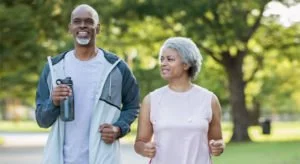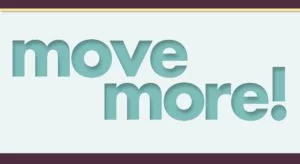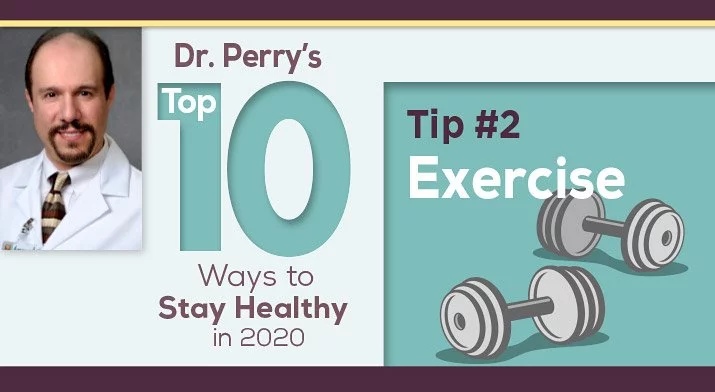Staying Healthy in 2020: Fitness Simplified
March 31, 2020
Home » Crouse Connects » Staying Healthy in 2020: Fitness Simplified
The start of spring is typically the perfect time to begin forming healthy exercise habits. This year, we find ourselves in the unique situation of social distancing due to the coronavirus pandemic, leading to the temporary closure of gyms and athletic clubs. Yet now, staying active is more important than ever for our bodies and minds.
Every person, regardless of age, size, race, and gender, benefits from regular exercise. Before starting any kind of program, I suggest talking with your primary care provider first. If no significant health problems cause restrictions, begin with a low impact aerobic exercise, to prevent orthopedic injuries, such as a using treadmill or elliptical and swimming. Once your aerobic practice is established, add in a weight training program to strengthen muscles.
No Gym Needed
We cannot all buy standing desks, gym memberships, protein supplements, or Fitbit watches. However, we can find alternatives to make working out more sustainable and fun for us.

YouTube and other online resources provide you with personal trainers and workout plans at your fingertips (literally). You can find Pilates, yoga, and HIIT videos that can be performed in the comfort of your home. If you want to add resistance to your workout, use dumbbells or, if you don’t have any, try heavy books or canned goods as a great substitute.
To assist in logging your workout progress without a smartwatch, consider using Google maps to track your jogging route. Write the distance on your calendar to see the miles add up over time. Try keeping track of how many sets and reps of exercises you complete to view your muscle gains. Seeing your progress over time is a great motivator to continue.
A Little Goes a Long Way
I recommend 30-45 minutes of exercise three days a week. The Mayo Clinic suggests 150 minutes of moderate activity or 75 of vigorous activity. In a busy life, this can seem daunting, but when you put it into perspective, you can complete your exercise in the same time it takes to watch one episode of a program. Try to maximize your time by multi-tasking during your exercise routines by listening to a podcast or audio book you’ve been meaning to hear.
Beyond a Body
Exercise can help people maintain their weight, prevent heart disease and prevent a variety of other conditions. However, exercise is not solely about your physique and improving physical ailments.
Your mood, concentration and sleep may improve as you introduce more activity in your life. Exercise triggers the release of dopamine — a chemical in our brain that allows us to feel happy. A good workout can also help you distress and reduce anxiety, so keep up the sweat! Finally, remember that exercise may help build esteem and boost your confidence because you will feel energized and empowered by what you have accomplished.
Just Start

I read once, “No matter how slow you go, you’re lapping everyone on the couch.” This is a perfect mantra to keep in mind as you consider improving your fitness journey. Doing something is better than doing nothing. Being active does not have to be about becoming a marathon runner or losing weight — it’s about improving your cardiovascular health, energy and quality of life.
There are also new recommendations from the CDC and US Department of Health and Human Services as outlined in the 2nd edition of the physical activity guidelines for Americans. These include evidence-based recommendations for ages 3-17, adults, older adults, women during pregnancy and the postpartum period, adults with chronic health conditions, and adults with disabilities.
The key points: moving more and sitting less. New evidence shows that physical activity has immediate health benefits, such as reducing anxiety, improving blood pressure and improving quality of sleep, and insulin sensitivity.
Live your best life by moving more.
Paraskos Araouzos, MD is known to his patients as 'Dr. Perry.' He is board certified in family medicine and a member of the American Medical Society and the American Academy of Family Physicians. Dr. Araouzos is welcoming new patients at Crouse Medical Practice in Manlius. For an appointment, call 315-682-6600.
Categories: Crouse Medical Practice, Crouse Physicians
Tags: covid-19, exercise, physical activity, primary care
Share this

